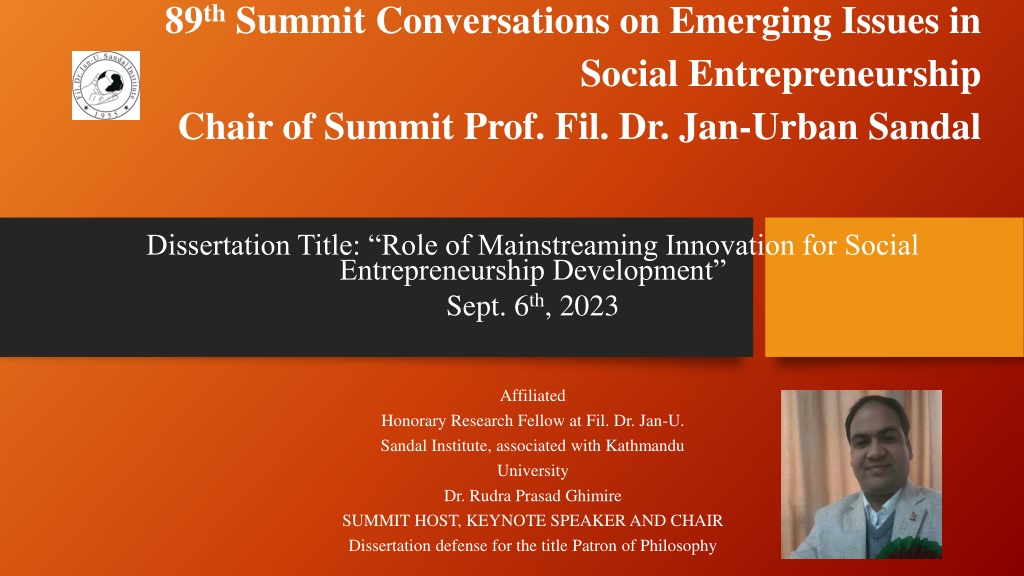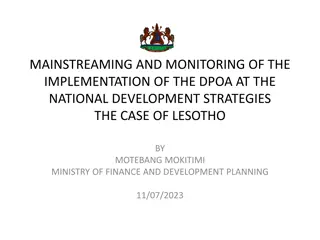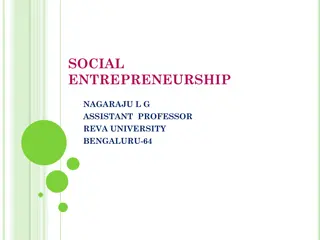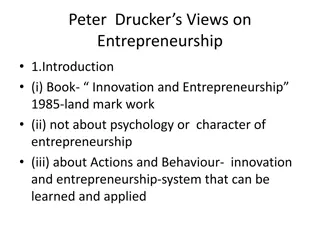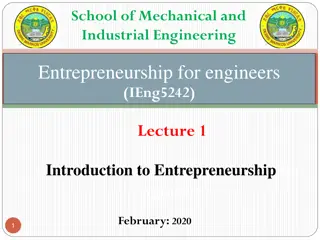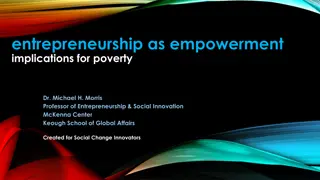Role of Mainstreaming Innovation in Social Entrepreneurship Development
Mainstreaming innovation in social entrepreneurship addresses complex socio-economic challenges, contributing to sustainable development goals. The study explores how it transforms lives and offers theories, methods, practices, and recommendations for entrepreneurship development.
- Social Entrepreneurship
- Mainstreaming Innovation
- Sustainable Development
- Entrepreneurship Development
Download Presentation

Please find below an Image/Link to download the presentation.
The content on the website is provided AS IS for your information and personal use only. It may not be sold, licensed, or shared on other websites without obtaining consent from the author. Download presentation by click this link. If you encounter any issues during the download, it is possible that the publisher has removed the file from their server.
E N D
Presentation Transcript
89thSummit Conversations on Emerging Issues in Social Entrepreneurship Chair of Summit Prof. Fil. Dr. Jan-Urban Sandal Dissertation Title: Role of Mainstreaming Innovation for Social Entrepreneurship Development Sept. 6th, 2023 Affiliated Honorary Research Fellow at Fil. Dr. Jan-U. Sandal Institute, associated with Kathmandu University Dr. Rudra Prasad Ghimire SUMMIT HOST, KEYNOTE SPEAKER AND CHAIR Dissertation defense for the title Patron of Philosophy
Role of Mainstreaming Innovation for Social Entrepreneurship Development Components of Presentation Introduction Previous research literature Idea of main articles Theory Methods and material Results Findings Concluding remarks
Introduction The mainstreaming of innovation for social entrepreneurship is emerging to tackle the complex socio-economic challenges at the forefront of government policy agendas globally. Several policy of governments have not been explored by mainstreaming the policy innovations for social entrepreneurship. Social entrepreneurship can contribute to individuals and communities and more broadly support sustainable development goals.
Previous Research Literature Social entrepreneurship is also becoming more self-sufficient and innovative, although more effort is required to build social entrepreneurship-related innovation theory (Certo and Miller, 2008; Harding, 2004; Johnson, 2000; Mulgan, 2006). As an entrepreneurial discipline, social entrepreneurship has a distinct focus on transforming society, creating social value, dealing with social problems, and improving society (Abu-Saifan, 2012; Hartigan, 2006; Drayton, 2002; Johnson, 2000; Roberts and Woods, 2005).
Mainstreaming Innovation as an Idea Since mainstreaming of innovation for social entrepreneurship is rooted to tackle socio-economic challenges globally. There is issue of government policy agendas to implement its program as targeted time. The community also has problem to solve the socio economic problem due to the lack of stimulating innovative factors. Though positive change makers of the society see the method of resilience to scape from the problem. Mainstreaming of innovation in any case support for sustainability of social development. Policy innovation survive business.
Aim of the Study The main aim of this study is to further observe role of mainstreaming innovation for social entrepreneurship development, and to find how it transforms quality of life of people living in the society. This study open eyes to develop the theory, methods, practices, and recommendations to mainstreaming of innovation in entrepreneurship development process. Additionally, recognizing for the title Patron of Philosophy from Affiliated Honorary Research Fellow 4 years program fulfillment scientific program Fil. Dr. Jan-U. Sandal Institute, Norway policy for sustainable social
Research Questions 1. 2. What are the objectives of social entrepreneurship? How social entrepreneurship thinking does relate to mainstream of innovation? 3. How do social entrepreneurs identify opportunities and transformational mainstreaming of innovation? 4. How is social entrepreneurship implemented? 5. How does it relate to practical action? 6. What is the bond between social entrepreneurship and innovation? 7. How does social entrepreneurship contribute to innovation?
Contribution The study possess opportunities and transformational role of innovation on social entrepreneurship development which presents the importance of functioning in real situation. The researh work which is useful to the researchers, learners and practitioners. The historical, epistemological, and theoretical review reveals critical role of mainstreaming of innovation on social entrepreneurship development. significant results that characterize the novelty of the The methodological approaches of the study also finds the way of social entrepreneurship development program implementation from which all stakeholders will find future path of mobility to this field. Mainstreaming of innovation plays vital role for business and social value development process. Mainstreaming of innovation in different stakeholders will have priority to mainstreaming of innovation in policy formulation and implementations. The substantiation of impact of mainstreaming of innovation to social entrepreneurship depends on practical action which has demonstrated the mechanism of dependability to each other. The analysis of bond between mainstreaming of innovation to social entrepreneurship has presented relationship to depend on practical execution. The contribution of social entrepreneurship to innovation possess the responsibility of business organization for social capital. The study has given a best solution if action goes by innovation. The existing knowledge on the topic will motivate further research for career and satisfaction of researchers.
Theory An innovation represents an idea or an object that is perceived to be new (Rogers Everett, 1995). Some of the most effective methods for cultivating social innovation start from the presumption that people are competent interpreters of their own lives, and competent solvers of their own problems (Mulgan, 2006). The social entrepreneurship has the potential to bring an interdisciplinary array of actors together, which has the potential to lead to various boundary-spanning research and practical activities (Robinson, 2006). The religion of social entrepreneurship is creating value in the society which definitely plugs social innovation (Dees, 2001).
Methods and Material The study is based on primary and secondary sources. However, the research is qualitative in nature. The purposive sampling was approached in the study. To fill out the questionnaire set, well experienced university professors, students, owner of business startup and social entrepreneurs were included. In order to collect from primary sources, the set of semi structured questionnaires were prepared and researcher himself met respondents in an interview and collected necessary information via telephonic conversation as well to receive qualitative information based on research questions. Interviews on an average lasted within 1 and half hours. Interviews were recorded, transcribed, coded, and further analyzed. For the secondary sources of information, the study has also reviewed the major four scientific articles as well as additional articles which have been written and published by author himself.
Methods and Material In addition, the study is based on mix of primary and secondary sources. However the research is qualitative in nature. The purposive sampling was approached in the study. To fill out the questionnaire set, well experienced 3 university professors, 3 students, 3 owner of business startup and 3 social entrepreneurs were included. In order to collect from primary sources, the 12 set of semi structured questionnaires were prepared including 7 number of questions, all together 84 questions were asked to respondents by researcher myself.
Results Development of social entrepreneurship depends on innovative idea combination of man, material, and money. Mainstreaming of innovation is an opportunity which uses the flat techniques for social entrepreneurship development. It is clear that there is a local area where innovation is required for social entrepreneurship development. To promote social impact at bottom level resource mobilization is the central point to create social value. The practice of social solution needs finance and implications of innovation. There is positive association between social entrepreneurship and innovation.
Findings Mainstreaming of innovation is the way of solving problem by examining serious issue by close observation. Social entrepreneurship can relate to mainstreaming of innovations practically. It finds positive results by knowing all resources. The involvement in innovation frontier transforms the society or an individual. Social entrepreneurship can be implemented by applying social innovation It is linked by people s development and program implementation with innovation, entrepreneurship, and innovation related activities.
Findings The coorelation between social entrepreneurship and innovation explores the sphere of socio economic development. Social entrepreneurship contributes to society by handling of innovation with responsibility, accountability, policy, and following innovation in resources, holistic changes process, positive change, and positive development. Flat social entrepreneurship has been appeared a new model keeping growth and development dynamics flatly in worldwide. It is finally a capital to develop social entrepreneurship and mainstreaming innovation everywhere.
The Practical Significance of the Obtained Results The study consists of scientific and theoretical, practical developments on the subject. All obtained results are recommendable in concept, theory and method. All stakeholders of innovation and social entrepreneurship can use the research outcomes who conducts practical activities. Mainstreaming of innovation is changing society business positively. The supportive relations creates the opportunities by policy innovation. development occur when policy formulations have to be integrated in the social entrepreneurship development process. The role of mainstreaming innovation has transformational role on individual and institution by learning and doing. Coordination of policy can unite study of structural and sectoral model development and such research analysis is needy dimensions in the diversity of resources mainstreaming innovation. A country can adopt the policy of mainstreaming innovation not only on social entrepreneurship field but also on education, health and environment. Likewise, flat social entrepreneurship generate opportunities technically is a unique analysis which has given the implications and has become a solid example of flourishing of innovation in the social entrepreneurship field. utilization productively by Rapid socio economic
Concluding Remarks Social entrepreneurship can fulfill the needs of the people. Sectoral mainstreaming of innovation is required to nurture the social entrepreneurship development. Social entrepreneurship harness the management of population, waste management, natural calamities, pollution management, science and technological management, child and youth sectors management, women entrepreneurship, agriculture development, health, education, leadership, political sector innovation, industry sectors, clean energy, infrastructures, transport and communications, hotels, trade, tourism sectors innovation, training and model for resilience of any transition etc. are junction to up rise social entrepreneurship worldwide. Hence, innovative policy ventures ties to the study of structural and sectoral model development and research analysis which is needy dimensions in the diverse resource combination under innovativ framework.
